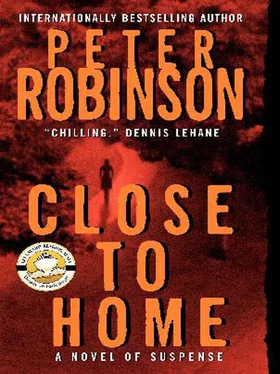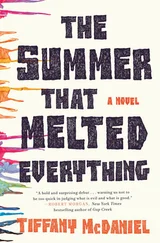“So maybe the kidnapper knew they were on their uppers?” Templeton suggested. “Maybe it’s someone who knows the family?”
“Then why kidnap Luke at all? Why not go for someone who had more money?”
“Maybe that’s all they needed. Maybe it’s enough.”
“You’re clutching at straws, Kev.”
Templeton smiled. “Just playing devil’s advocate, ma’m, that’s all. But if you’re right, then perhaps they don’t have quite the intelligence we’re crediting them with.”
“Okay. Point taken.” Annie looked at Gristhorpe. “But don’t you think it’s all a bit puzzling when you add it up, sir?”
Gristhorpe paused and made a steeple of his thick fingers on the desk before answering. “I do,” he said. “I can’t say I’ve had to deal with many kidnappings over the course of my career – and for that I thank the Lord, because it’s a cowardly crime – but I’ve dealt with a few, and none of them have been as riddled with anomalies as this one. What are your conclusions, Annie?”
“Either it’s an amateur job,” Annie answered. “ Very amateur, like some junkie who saw the chance to get enough money for his next few fixes and now he’s too scared to go through with it.”
“Or?”
“Or it’s something else entirely. A setup, a diversion, the ransom demand merely to deflect us, confuse us, and something else is going on.”
“Like what?” Gristhorpe asked.
“I don’t know, sir,” Annie answered. “All I know is that in either scenario the outcome looks bad for Luke.”
It wasn’t fair, thought Andrew Naylor, the man from the Ministry, as he drove his government Range Rover over the disinfectant pad at the entrance to the unfenced road above Gratly. He had nothing to do with foot-and-mouth control, yet in the eyes of the locals, all government employees were tarred with the same brush. Everyone knew him in the area, and before the outbreak no one had paid him much mind. Now, though, he was getting sick of the resentful looks he got when he walked into a shop or a pub, the way conversations stopped and whispers began, and the way people sometimes even expressed their anger to his face. In one pub, they had been so hostile toward him he thought they were going to beat him up.
It didn’t do the slightest bit of good to tell them that he worked for the Department for the Environment, Food and Rural Affairs, DEFRA, in the Water and Land Directorate, and that his job was water, because that only made them think of Yorkshire Water – of droughts, leakages, shortages and restrictions on washing their bloody cars and watering their lawns – and then they got even angrier.
It was part of Andrew’s job to collect water samples from local lakes, ponds, tarns and reservoirs, and these were later tested for contaminants at the Central Science Laboratory. Because some of these bodies of water were surrounded by open country, Andrew was one of the few with a special dispensation to visit them, after taking all the proper precautions, of course.
That day, his last call was Hallam Tarn, a godforsaken, hollowed-out bowl of water on the very top of the moor, beyond Tetchley Fell. Legend had it that the place used to be a village once, but the villagers took to Satanic practices, so God smote them with his fist and the tarn was created in place of the village. It was said that on certain days of the year you could see the old houses and streets beneath the water’s surface and hear the cries of the villagers. Sometimes, when the light was right and the curlew’s cry piped across the desolate moor, Andrew could almost believe it.
Today, though, the sun was shining, and the honeyed air was still and sweet. Summer seemed to have arrived at last, and Andrew couldn’t imagine any hint of evil taking place.
The deepest part of the tarn ran closest to the road, and a tall, solid drystone wall separated it from children and drunks and anyone else foolish enough to wander around up there in the dark. To get access to the water, you had to drive a few yards farther on, cross the stile and take a footpath that led to its shallow shore. In the days before the government restrictions, it had been a popular spot for ramblers and picnickers, but these days it was off-limits, except to people such as Andrew. A government poster nailed to the stile warned people to stay out on penalty of a steep fine.
Before heading out with his dinghy and his sample jar, Andrew sprayed his Wellington boots with disinfectant and donned his plastic outerwear. He felt like a spaceman preparing for a walk on the moon. He also felt hot inside the protective clothing, and all he wanted to do was get this over with as soon as possible, then head home for a nice long bath and an evening out in Northallerton with Nancy, maybe the pictures, a spot of dinner and a drink after.
Feeling the sweat drip down the back of his neck, he walked along the narrow dirt path the hundred yards or so to the edge of the tarn and squatted by the waterside to fill his sample jar. It was so quiet up there, he could imagine himself the only man left in the world. Because he had to take samples from various depths, he got in the small dinghy and began to row. The tarn wasn’t much bigger than a large pond, maybe a couple of hundred yards long and a hundred wide, but it was quite deep in places. Andrew felt a little disquiet at being out there all alone, not another soul in sight, and whenever he looked down into the water he fancied he could see a roof or a street below. It was an optical illusion, of course, most likely caused by the sun on the water, but it unnerved him nonetheless.
When he neared the wall, he noticed some dark material snagged on the roots of an old tree. The tree was gone, but gnarled roots still jutted out of the bank like arms reaching out of a grave, and there was something about their arched, sinewy shapes that upset Andrew even more. Curious about the material, however, he put his fears aside and rowed closer. Legends and myths couldn’t harm him.
When he got near enough, he stretched out his arm and tried to free the material from the root. It was heavier than he thought, and as it jerked free, the dinghy tipped and Andrew, off-balance, fell into the tarn. He was a strong swimmer, so drowning didn’t worry him, but what chilled his blood was that the thing he was holding tightly as a lover in a slow dance was a dead body, and from its ashen face, open dead eyes looked directly into his.
Andrew let go of the burden, mouth full of bile. He struggled back into the dinghy, salvaged his oars and rowed back to shore, where he stopped only long enough to be sick, before squelching back to his van, hoping to God his mobile worked up there. It didn’t. Cursing, he threw it on the floor and started the van with shaking hands. As he drove back toward Helmthorpe, he glanced frequently in his rearview mirror to make sure that no misshapen, supernatural beasts from the depths of the tarn were following him.
Banks still felt angry when he pulled up outside his parents’ house, brakes squealing, but before he went inside he took several deep breaths, determined not to let it show. His parents didn’t need it; they had problems enough of their own. He found his father in front of the television watching horse racing and his mother in the kitchen fussing over a cake.
“I’m heading home this afternoon,” he said, popping his head around the kitchen door. “Thanks for letting me stay.”
“There’s always a bed for you here,” his mother said. “You know that, son. Have you finished what you came for?”
“Not really,” said Banks, “but there’s not a lot more I can do.”
“You’re a policeman. Surely you can do something to help?”
The ways Banks’s mother said “policeman” wasn’t quite as vehement as the way his father said it, nor was it as tinged with distaste as the way she used to say it, but it wasn’t far off, which was why it had surprised Banks when Mrs. Marshall told him his mother was proud of him. Banks’s mother had always made it clear that she thought he had sold himself short, that he should have gone into commerce and worked himself up to be managing director of some big international company. It didn’t seem to matter how well he did in his job, or how often he was promoted; to his mother, his career choice was undignified, and his achievements always seemed to pale beside those of his stockbroker brother, Roy. Banks had always suspected that Roy was a bit of a shady dealer, a frequent enough occurrence in the world of financial speculation, in his experience, though he would never voice such suspicions to his mother, or indeed to Roy himself. Still, he lived in dread of that telephone call coming from his brother one day: “Alan, can you help me? I’m in a bit of a fix with the law.”
Читать дальше












